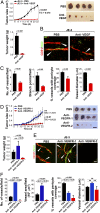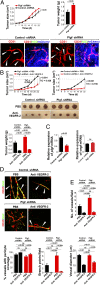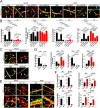Tumor cell-derived placental growth factor sensitizes antiangiogenic and antitumor effects of anti-VEGF drugs
- PMID: 23267058
- PMCID: PMC3545771
- DOI: 10.1073/pnas.1209310110
Tumor cell-derived placental growth factor sensitizes antiangiogenic and antitumor effects of anti-VEGF drugs
Abstract
The role of placental growth factor (PlGF) in modulation of tumor angiogenesis and tumor growth remains an enigma. Furthermore, anti-PlGF therapy in tumor angiogenesis and tumor growth remains controversial in preclinical tumor models. Here we show that in both human and mouse tumors, PlGF induced the formation of dilated and normalized vascular networks that were hypersensitive to anti-VEGF and anti-VEGFR-2 therapy, leading to dormancy of a substantial number of avascular tumors. Loss-of-function using plgf shRNA in a human choriocarcinoma significantly accelerated tumor growth rates and acquired resistance to anti-VEGF drugs, whereas gain-of-function of PlGF in a mouse tumor increased anti-VEGF sensitivity. Further, we show that VEGFR-2 and VEGFR-1 blocking antibodies displayed opposing effects on tumor angiogenesis. VEGFR-1 blockade and genetic deletion of the tyrosine kinase domain of VEGFR-1 resulted in enhanced tumor angiogenesis. These findings demonstrate that tumor-derived PlGF negatively modulates tumor angiogenesis and tumor growth and may potentially serve as a predictive marker of anti-VEGF cancer therapy.
Conflict of interest statement
The authors declare no conflict of interest.
Figures




References
-
- Cao Y, et al. 2011. Forty-year journey of angiogenesis translational research. Sci Transl Med 3(114):114rv113.
-
- Cao Y, Langer R. Optimizing the delivery of cancer drugs that block angiogenesis. Sci Transl Med. 2010;2(15):ps3. - PubMed
-
- Cao Y. Positive and negative modulation of angiogenesis by VEGFR1 ligands. Sci Signal. 2009;2(59):re1. - PubMed
Publication types
MeSH terms
Substances
LinkOut - more resources
Full Text Sources
Molecular Biology Databases
Miscellaneous

